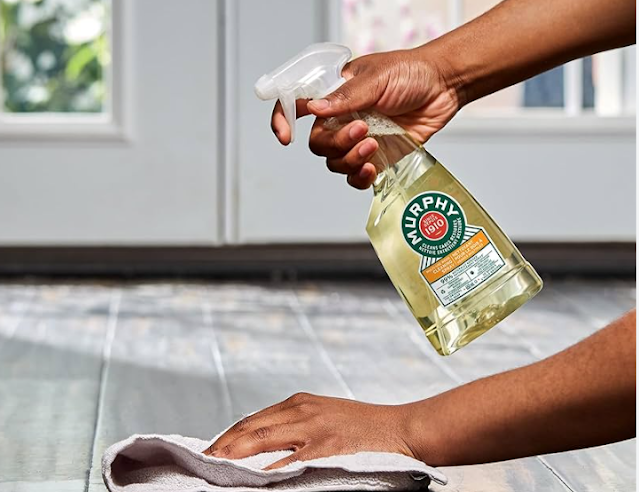Murphy Oil Soap has earned its place as a trusted household cleaner due to its effective yet gentle formulation, particularly for finished wood surfaces.
For generations, Murphy Oil Soap has been a staple in households, renowned for its ability to clean and restore the natural beauty of wood. But is this iconic cleaner truly a miracle worker for all your wooden treasures, and what about other surfaces like leather? Let's delve into the ingredients and explore the best uses of Murphy Oil Soap, ensuring your home looks its best, naturally.
Buy Now in AMAZONUnderstanding the Magic: What's in Murphy Oil Soap?
Murphy Oil Soap's effectiveness lies in its unique, plant-derived formula. While the exact proportions are proprietary, the primary active ingredients typically include:
Water: The main carrier for the cleaning agents.
Potassium Cocoate/Potassium Olivate: These are potassium salts of fatty acids derived from coconut oil and olive oil, respectively. Essentially, they are gentle soaps that lift dirt and grime without harsh chemicals.
Natural Fragrance: Often derived from citrus oils, providing that signature clean scent.
Preservatives: In small amounts, to ensure product stability and shelf life.
Crucially, Murphy Oil Soap is celebrated for being phosphate-free and biodegradable, making it a more environmentally conscious choice compared to many conventional cleaners. It also boasts a low pH, which is key to its gentleness on wood.
Murphy Oil Soap on Wood Floors: A Timeless Solution
Wood floors are an investment, and proper care is essential to maintain their luster. Murphy Oil Soap has long been a go-to for this purpose, and for good reason:
Gentle Cleaning: Unlike harsh detergents that can strip natural oils, Murphy Oil Soap cleans by emulsifying dirt and grime, leaving the wood's natural finish intact.
Restores Luster: The oil-based soap helps to moisturize the wood, bringing out its natural warmth and shine without leaving a greasy residue.
Safe for Finished Wood: It's generally safe for most sealed or finished wood floors (e.g., polyurethane, varnish). Always test in an inconspicuous area first.
How to Use on Wood Floors:
Dilute: Mix 1/4 cup of Murphy Oil Soap with 1 gallon of warm water. For tougher spots, you can use a slightly stronger concentration.
Damp Mop: Wring your mop or cloth thoroughly so it's only damp, not dripping wet. Excess water can damage wood floors.
Mop in Sections: Clean a small section at a time, rinsing your mop frequently in the solution.
Dry Thoroughly: Allow the floor to air dry, or for best results, dry with a clean, soft cloth to prevent water spots.
Important Note: Murphy Oil Soap is not recommended for unsealed, waxed, or oiled wood floors, as it can potentially lift waxes or penetrate unfinished wood, leading to damage. Always check your floor manufacturer's recommendations.
Rejuvenating Your Wood Cabinets
Kitchen and bathroom cabinets, especially those made of wood, can accumulate grease, grime, and fingerprints over time. Murphy Oil Soap offers an excellent solution for their gentle cleaning:
Cuts Through Grease: Its mild cleaning agents effectively break down cooking grease and sticky residues.
Preserves Finish: It cleans without dulling or damaging the wood's finish, keeping your cabinets looking new.
Enhances Grain: Regular cleaning can help highlight the natural beauty of the wood grain.
How to Use on Wood Cabinets:
Dilute: Mix 1/4 cup of Murphy Oil Soap with 1 gallon of warm water.
Damp Cloth: Dip a soft cloth into the solution and wring it out well so it's just damp.
Wipe Down: Gently wipe down cabinet surfaces, paying attention to greasy areas.
Rinse (Optional but Recommended): For a streak-free finish, follow with a second pass using a cloth dampened with plain water.
Dry: Buff dry with a clean, dry microfiber cloth.
Can You Use Murphy Oil Soap on Leather?
This is where caution is key! While Murphy Oil Soap is excellent for wood, it is generally not recommended for use on leather.
Here's why:
Moisture Content: Leather is a skin, and like our skin, it requires specific conditioning to remain supple. Excess water, even from a dilute solution, can dry out leather, leading to cracking and stiffness over time.
Stripping Natural Oils: While gentle, the soap in Murphy Oil Soap can potentially strip the natural oils that keep leather soft and prevent it from drying out.
Finish Damage: Some leather finishes or dyes can react negatively to cleaning products not specifically formulated for leather, leading to discoloration or damage.
Instead, for leather, always opt for cleaning products specifically designed for leather care. These products are formulated to clean, condition, and protect leather without causing damage.
The Verdict: A Gentle Giant for Wood
Murphy Oil Soap has earned its place as a trusted household cleaner due to its effective yet gentle formulation, particularly for finished wood surfaces. Its plant-derived ingredients and mild nature make it a smart choice for maintaining the beauty of your wood floors and cabinets. However, remember that not all surfaces are created equal, and for delicate materials like leather, specialized care is always the best approach.
By understanding its ingredients and proper application, you can harness the power of Murphy Oil Soap to keep your home looking its best, naturally.




